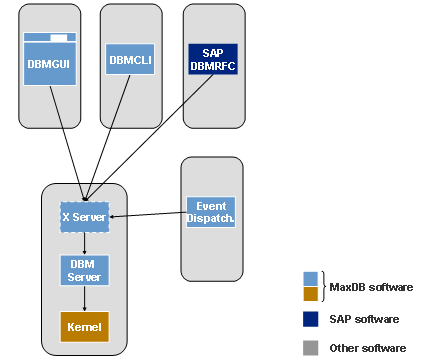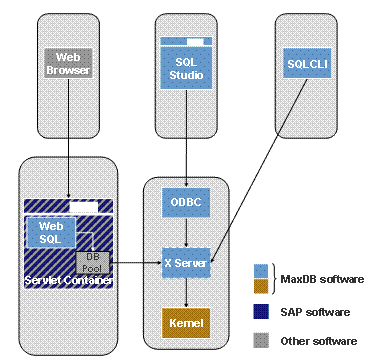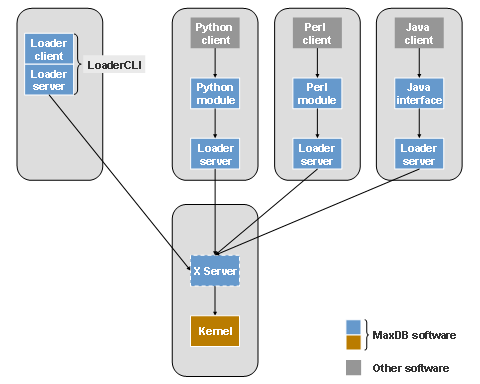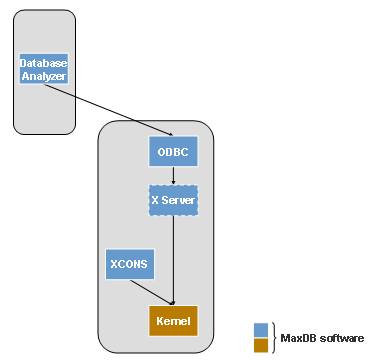 Architecture of the Database Tools
Architecture of the Database Tools 
Some database tools are available in several variants. And some database tools are comprised of multiple components.
If the database
tool is on a different computer than the database instance, the database
system also needs the MaxDB X Server (communication server) for communication.
See the  X
Server documentation.
X
Server documentation.
Database Manager
The Database Manager database tool consists of a client part and a server part. The client part of the Database Manager is available in several variants:
● Database Manager GUI (DBMGUI): graphical user interface
● Database Manager CLI (DBMCLI): command line interface
● Database Manager RFC (DBMRFC): interface to the SAP system; only in SAP systems
All of these variants require the DBM server to communicate with the kernel and execute commands. The DBM server is the server part of the Database Manager database tool and is always located on the same computer as the database instance. The event dispatcher also communicates with the kernel via the DBM server.
If the client part of the Database Manager/event dispatcher and the database instance are located on different computers, you also need the X Server to communicate with the DBM server.
Database Manager and Event Dispatcher

Query Tools
The query tools are the database tools with which you can execute SQL statements. They come in three variants:
● Web SQL Studio: web-based user interface
● SQL Studio: graphical user interface
● SQLCLI: command line interface
Web SQL communicates with the kernel via the servlet container (e.g. Apache Tomcat or SAP NetWeaver AS); SQL Studio communicates with the kernel through the ODBC interface; and SQLCLI communicates with the kernel directly. If the database tools are on a different computer than the database instance, they also need the X Server to communicate with the database instance.
Query Tools

Loader
The Loader database tool consists of a client part and a server part:
● Loader client
● Loader server
The Loader client transmits the commands to be processed. The Loader server creates the connection between the Loader client and the database instance and processes the commands. The Loader client and the Loader server are always installed on the same computer (LoaderCLI).
You can access the Loader using the following interfaces:
● Python module: sdb.loader
● Perl module: SAP::DBTech::loader
● The Loader’s Java interface: com.sap.dbtech.powertoys.Loader
If you use files as data carriers for exporting or importing data we recommend that you install the Loader server on the computer on which the data is located.
If the Loader is on a different computer than the database instance, the Loader also needs the X Server to communicate with the database instance.
Loader

XUSER
The database tool XUSER does not communicate directly with the other database tools or the kernel; it only writes XUSER information to the file system. Database tools that use XUSER directly access the XUSER information in the file system.
XUSER
Error! Objects cannot be created from editing field codes.
Synchronization Manager
See Synchronization
Manager,  Technical System
Landscape.
Technical System
Landscape.
Additional Database Tools
The database tool XCONS communicates directly with the kernel. It must be installed on the same computer as the database instance.
The Database Analyzer database tool communicates with the kernel using ODBC. If the Database Analyzer is on a different computer than the database instance, the Database Analyzer also needs the X Server to communicate with the database instance.
Additional Database Tools

See also:
